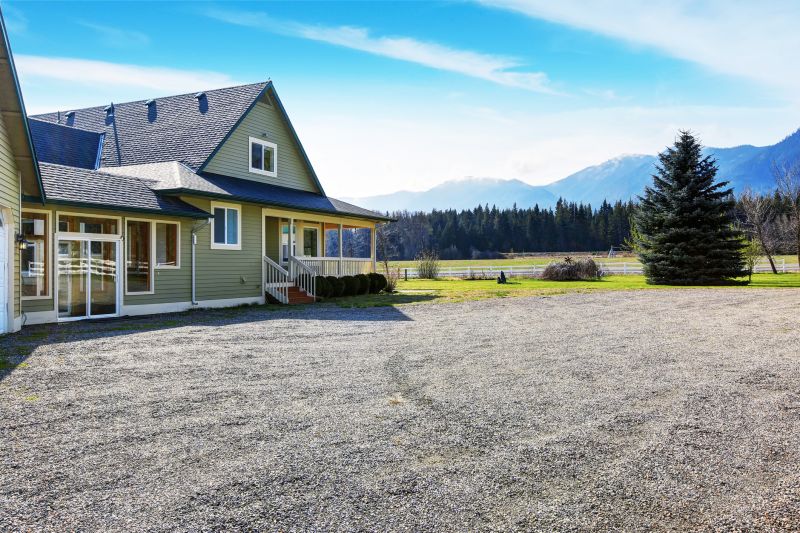Top-Rated Products for Perfect Stone Driveway Spreadings
Choose from high-quality materials and accessories that help you create a durable and visually appealing driveway.
 Choosing the right products for stone driveway spreadings is essential for creating a stable and visually appealing surface. These products help in filling gaps, providing drainage, and enhancing the overall durability of the driveway. From different types of gravel and crushed stones to specialized binding materials, there is a wide array of options suited for various driveway conditions and aesthetic preferences. Understanding the characteristics of each product type can assist homeowners and contractors in making informed decisions that align with their specific needs.
Choosing the right products for stone driveway spreadings is essential for creating a stable and visually appealing surface. These products help in filling gaps, providing drainage, and enhancing the overall durability of the driveway. From different types of gravel and crushed stones to specialized binding materials, there is a wide array of options suited for various driveway conditions and aesthetic preferences. Understanding the characteristics of each product type can assist homeowners and contractors in making informed decisions that align with their specific needs.
Top Overall Option
Crushed Stone Aggregate
Crushed stone aggregate is a versatile and widely used material for stone driveway spreadings. It offers excellent drainage properties and compacts well to create a stable surface. Its varied sizes allow for customization based on specific driveway needs, making it suitable for both foundational layers and surface finishing. When properly installed, crushed stone can help maintain the driveway's integrity over time, providing a durable base that resists shifting and erosion.
Types of Products For Stone Driveway Spreadings
Crushed Gravel
Crushed gravel consists of angular stones that lock together, providing stability and good drainage for driveways.
Pea Gravel
Small, rounded stones that create a smooth surface, often used for aesthetic appeal and light traffic driveways.
Decomposed Granite
Fine granite particles that compact tightly, offering a natural look with good drainage properties.
Crushed Limestone
Limestone fragments that are durable and suitable for creating a solid base with natural color variations.
River Rock
Smooth, rounded stones that provide a decorative touch and are often used in top layers.
Recycled Concrete Aggregate
Crushed concrete pieces that serve as a sustainable option with good load-bearing qualities.
Sand Base
Fine sand used as a leveling layer beneath other aggregate materials for smoothness and stability.
Polymeric Sand
A binding material that hardens when wet, helping to lock in stones and prevent weed growth.
Stone Dust
Fine dust from crushed stone that acts as a binder and leveling agent for driveway surfaces.
Flagstone Chips
Flat, decorative stones that can be used for top layers to enhance visual appeal.
Bedding Sand
A coarse sand used as a foundation layer to facilitate proper drainage and leveling.
Granite Chips
Durable granite fragments that add a natural look and stability to the driveway surface.
Slate Chips
Thin, flat stones that provide a distinctive appearance and are suitable for decorative layers.
Crushed Basalt
Dark-colored volcanic rock that offers strength and a modern aesthetic for driveways.
Limestone Chips
Light-colored stones that blend well with natural surroundings and provide a firm base.
Marble Chips
Elegant, smooth stones often used for decorative top layers in driveways.
Popular Choices
A common choice for foundational and surface layers, valued for its stability and drainage.
Favored for its smooth texture and decorative appeal in lighter traffic driveways.
Popular for its natural appearance and ability to compact tightly for a solid surface.
An increasingly favored sustainable option with reliable load-bearing capacity.
Widely used for binding stones and preventing weed growth in driveways.
Commonly applied as a leveling agent and binder in driveway construction.
Chosen for decorative top layers and aesthetic enhancement.
Frequently used as a base layer to ensure proper drainage and leveling.
Popular for their durability and natural appearance in various driveway designs.
A common choice for light-colored, natural-looking driveway surfaces.
Selected for its strength and modern aesthetic appeal in contemporary driveways.
Proper installation and selection of spreading materials can significantly influence the longevity and performance of a stone driveway. Factors such as material size, compaction qualities, and ease of application play a role in achieving a smooth and stable surface. Additionally, considering the local climate and traffic volume can help determine the most appropriate products to withstand weather conditions and usage patterns.
Investing in quality spreading materials can also reduce maintenance requirements over time. Well-chosen products can resist shifting, erosion, and weed growth, maintaining the driveway's appearance and functionality. Regular inspection and timely replenishment of spreading materials contribute to the long-term health of the driveway, ensuring it remains a reliable and attractive feature of your property.
Key Buying Considerations
- Material size and gradation to match driveway design and stability needs
- Drainage properties to prevent water pooling and erosion
- Ease of installation and leveling requirements
- Compatibility with existing driveway surface and base layers
- Durability and resistance to shifting or erosion over time
- Color and aesthetic preferences to match landscape design
- Availability and cost of materials in your region
- Compatibility with binding agents like polymeric sand if used
- Environmental conditions such as rainfall and freeze-thaw cycles
- Maintenance requirements and ease of replenishment
- Impact on vehicle traction and safety
- Potential for weed growth and whether weed prevention measures are necessary
- Compatibility with underlying soil and foundation stability
- Size and shape of stones for desired visual effect and performance
- Long-term performance expectations based on material type
